Philips Fidelio M2L review
Thanks to a Lightning connector the Philips Fidelio M2L finally brings high-res audio to the iPhone
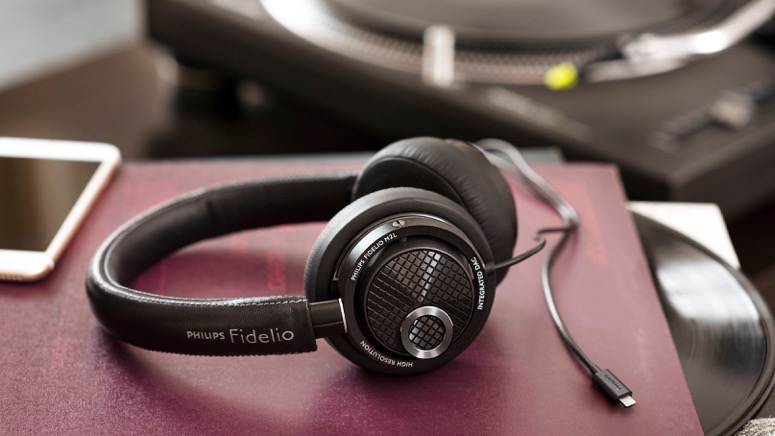
-
+
All-digital design
-
+
High-res audio from an iPhone
-
+
Deep
-
+
dynamic bass
-
-
Lightning devices only
-
-
No adapter included
-
-
Bit of a tight fit
Why you can trust T3
Ditching the headphone jack for a Lightning connector is a bold move, but is it wise to commit to one brand on the promise of high-res audio? Find out in our Philips Fidelio M2L review
With no, headphone jack, or even an adapter in the box, these Lightning-tipped headphones work with just two products, but if you happen to own a compatible iPhone, or iPad, the Philips Fidelio M2L promise to banish the crosstalk and interference associated with flaky analogue jacks and unlock the high-res potential of your iOS device for the first time.
It's a logical progression, but you might have expected to find the first Lightning connector on the end of a pair of Beats By Dre Studio following the acquisition last year by Apple. Perhaps it was deemed too soon to lock in such a popular brand with a proprietary plug. Meanwhile, the Sony MDR-1ADAC offers a similar high-res proposition by incorporating a 24bit/192kHz DAC, but with a regular analogue jack, they still cannot extract high-res from an iOS device.
So Philips is the first to implement a Lightning connector, choosing the audiophile grade Fidelio brand and the rather good M-series on-ear headphones to showcase it. At £230, only the most committed Apple fanboys need apply, because the Philips Fidelio M2L won't work with anything else.
Philips Fidelio M2L: Features
While it's definitely the Lightning connector that sets the Philips Fidelio M2L apart, it's the inbuilt 24-bit Digital to Analogue Converter (DAC) and amplification that give them a technical edge over the similarly styled, but regular analogue-flavoured Fidelio M1 that we're using for comparison here. This also allows the addition of a digital volume control on the earcup that will not add any audible interference.
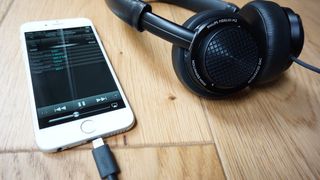
There's no in-line microphone or remote playback controls and more significantly, no Lightning-to-minijack adapter. The only accessory is a rather smart black faux suede drawstring bag.
Philips Fidelio M2L: Comfort and build quality
The closed back, on-ear design is lightweight and remains clamped to your head while you move about thanks to a fairly stiff steel headband. They won't crush your ear cartilage, but they do become tiring after a while. Hand stitched leather around the headband and matching memory foam ear pads give a degree of comfort and add to the quality feel of these premium headphones.
The one-meter cable is fixed, so don't think that you can swap if for a regular one and listen to a non-iOS device. That's not going to happen without some kind of adapter, which isn't available yet. The big advantage here is that the signal travelling through the cable is digital and therefore not susceptible to the crosstalk and interference that can degrade analogue sound.
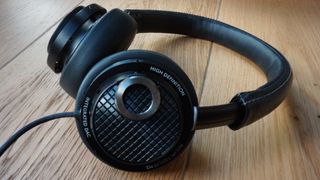
Philips Fidelio M2L: Sound quality
Like their analogue counterparts, the excellent Philips Fidelio M1, the Fidelio M2L achieve the same open and revealing soundstage with a particularly descriptive and dynamic bass response. Using similar neodymium drivers and bass reflex system, it's not so surprising, but by directly comparing the two, the advantages of an integrated DAC and all-digital signal path are revealed.
Firstly, there's no hiss, or noise from the cable or headphone controls, so the sound of the Philips Fidelio M2L is particularly clean and crisp. Secondly, the bass sounds even more agile and engaging than with the analogue Fidelio M1 headphones, and its particularly noticeable when listening to high-resolution files. The FLAC file of Miss You by the Rolling Stones with a sample rate of 88.2kHz adds a little more bounce to the bassline when you switch directly from the M1s plugged into the iPhone's analogue headphone jack to the M2Ls hooked up by their Lightning connector.
iTunes might not allow you to port high resolution tracks to your iPhone 6 yet (even Apple's own ALAC files) but third party iOS apps, like Onkyo HF Player, will let you import and play FLAC, ALAC and even DSD files in full high resolution. The catch is that they're downsized by the iPhone's DAC to fit through the headphone jack. Thanks to their Lightning connector however, the Philips Fidelio M2L can draw a pure digital signal and use their own 24-bit/92kHz DAC to deliver high-res audio to your ears.

There's some debate over the advantage of playing frequencies beyond the range of human hearing, but certainly those that you can hear benefit from the absence of the lossy heavy-handed compression used to shrink your MP3s. Try some well recorded and mastered uncompressed files for yourself and we think you'll detect the difference too.
Philips Fidelio M2L: Verdict
So should you invest such a sum in headphones that will only plug into two existing products (iPhone and iPad). That really depends on how committed you are to Apple, but we're assuming some kind of adapter will become widely available soon enough. In the meantime, there are real advantages in keeping everything digital. Eliminating crosstalk and interference from the cable and controls is one of them, while the ability to play uncompressed formats on your iPhone in real high resolution is another.
Given the superior build quality, the open soundstage and the thrilling bass response, we'll happily recommend these forward-thinking but highly exclusive headphones to iPhone users.
Update: Apple have been in touch to clarify that Apple's Lightning connector protocol limits the output to 24bit/48kHz, so that's still high-res, although not the full fat 192kHz variety.
Philips Fidelio M2L release date: Out now
Philips Fidelio M2L price: £199
Sign up to the T3 newsletter for smarter living straight to your inbox
Get all the latest news, reviews, deals and buying guides on gorgeous tech, home and active products from the T3 experts
-
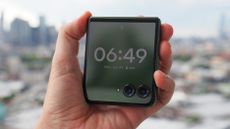 Motorola Razr 60 Ultra looking like it'll be the flip phone to beat this year
Motorola Razr 60 Ultra looking like it'll be the flip phone to beat this yearIt looks great and its specs are impressive, based on the most recent leaks
By Britta O'Boyle Published
-
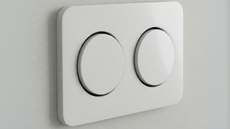 IKEA’s latest smart home gadget just leaked – and it's a complete game-changer
IKEA’s latest smart home gadget just leaked – and it's a complete game-changerI'm seriously excited about this one
By Lizzie Wilmot Published
-
 Disney+'s best sci-fi show gets a phenomenal trailer – I cannot wait any longer
Disney+'s best sci-fi show gets a phenomenal trailer – I cannot wait any longerAndor needs to be out already
By Max Freeman-Mills Published